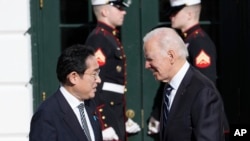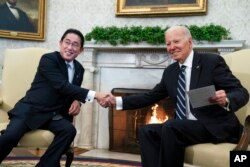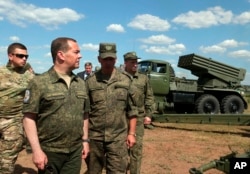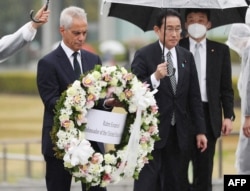On January 13, U.S. President Joe Biden met with Japanese Prime Minister Fumio Kishida in Washington, D.C. The event was part of Kishida’s five-nation tour of Western allies, visits that have focused on defense and mutual security.
In a joint statement, the two sides cited challenges that “transcend geography,” including “Russia’s unjust and brutal war of aggression against Ukraine.”
The Biden-Kishida statement expressed their “unwavering support for Ukraine” and warned “that any use of a nuclear weapon by Russia in Ukraine would be an act of hostility against humanity and unjustifiable in any way.”
That prompted a harsh response from former Russian President Dmitry Medvedev.
“This is such a monstrous shame that I will not even comment on the paranoia about out state’s nuclear plans,” wrote Medvedev, now a deputy chairman of Russia’s Security Council, on his personal Telegram channel.
“Think about it. The head of the Japanese government, in a humiliating ecstasy of loyalty, is talking nonsense about Russia, having betrayed the memory of hundreds of thousands of Japanese who burned in the nuclear fire of Hiroshima and Nagasaki. And Kishida absolutely does not care that the only country that fully used nuclear weapons was the United States.”
Medvedev called Kishida a servant of the U.S. and suggested the Japanese PM’s shame could only be “washed away” through “seppuku” – a form of ritual suicide.
In fact, this is misleading. It is Medvedev and other Kremlin officials who’ve engaged in nuclear saber-rattling since Russia invaded Ukraine. The use of nuclear weapons by the U.S. against Imperial Japan during the Second World War, while controversial still, is a separate issue from the potential threat of Russian nuclear aggression in Ukraine.
Days after invading in February 2022, Russian President Vladimir Putin put Russia’s nuclear deterrence forces on “high alert.”
Putin said “aggressive statements against our country” by senior officials from “leading NATO countries” prompted the move, despite the fact that it was Russia that launched the war against its neighbor.
In March, Kremlin spokesman Dmitry Peskov told CNN International that Russia could use nuclear weapons if faced with an “existential threat.”
In May, Putin said that anyone who got in Russia’s way in Ukraine would face “such consequences that you have never encountered in your history,” a remark widely taken to mean use of nuclear force.
That same month, Medvedev warned that Western assistance for Ukraine increased “the likelihood of a direct and open conflict between NATO and Russia.”
“Such a conflict always has the risk of turning into a full-fledged nuclear war,” Medvedev said.
Then, on September 21, Putin again appeared to express his willingness to use nuclear weapons: "If the territorial integrity of our country is threatened, we will without doubt use all available means to protect Russia and our people – this is not a bluff. … And those who try to blackmail us with nuclear weapons should know that the weather vane can turn and point towards them.”
No country has threatened to attack Russia with nuclear weapons. Nonetheless, Medvedev said at the time that Putin’s comments are “certainly not a bluff.”
“Let's imagine that Russia is forced to use the most fearsome weapon against the Ukrainian regime, which had committed a large-scale act of aggression that is dangerous for the very existence of our state,” Medvedev said in a September Telegram post, the Reuters news agency reported.
When those comments were made, Russia was illegally attempting to annex more Ukrainian territory, raising the possibility that Moscow could frame Kyiv’s attempts to recapture its own land as an attack on Russia itself.
In November, after a Ukrainian counteroffensive forced Russia to abandon the regional capital Kherson (Russia had already “annexed” Kherson region), Medvedev took to Telegram to warn, "Russia, for obvious reasons, has not yet used its entire arsenal of possible weapons, equipment and munitions.”
The following month, Medvedev again raised the threat of nuclear force.
"Is the West ready to unleash a fully-fledged war against us, including a nuclear war, at the hands of Kyiv?” Reuters reported, citing an article Medvedev wrote for the Russian government newspaper Rossiskaya Gazeta.
"The only thing that stops our enemies today is the understanding that Russia will be guided by the fundamentals of state policy ... on nuclear deterrence,” Medvedev wrote. “And in the event that a real threat arises, it will act on them.”
Medvedev has also compared Ukrainian officials to cockroaches and called for the “liquidation” of Ukrainian statehood.
In October, the head of Russia's Chechnya region, Ramzan Kadyrov, who has promoted the role of his military forces in the Ukraine war, suggested “the use of low-yield nuclear weapons” following battlefield setbacks.
Those statements prompted a carefully worded pushback from the Kremlin.
On January 17, Kadyrov said Russia would never allow itself to lose a battle, adding: “We can push the button and 'Salam Aleykum'!" [i.e., 'peace be upon you.']
Meantime, leading Russian state media pundits regularly threaten the use of nuclear weapons.
Multiple U.S. officials said senior Russian military leaders had discussed using a tactical nuclear weapon in Ukraine, but they added there is no evidence Russia is actually preparing for a strike, The New York Times has reported.
Analysts told the German broadcaster Deutsche Welle in February that raising the nuclear threat reminds the world of Russia’s atomic arsenal, potentially positions Moscow to demand concessions and costs Putin “nothing.”
It is not surprising that Medvedev cited the war between the U.S. and Imperial Japan, given that Russian disinformation regularly cites the Soviet Union’s battles against Nazi Germany in the Second World War to justify its war against Ukraine. Russia has falsely claimed it invaded Ukraine to “de-nazify” and “de-militarize” the country.
As the U.S. State Department noted in July: "By evoking Nazism and the horrors associated with World War II and the Holocaust, the Kremlin hopes to delegitimize and demonize Ukraine in the eyes of the Russian public and the world.”
In May, Russia’s ambassador to Japan called out Tokyo for not being more critical of the U.S. for dropping atomic bombs on Hiroshima and Nagasaki in 1945. He also drew a false parallel between the West and Japan’s opposition to Russia’s war in Ukraine and Imperial Japan siding with Nazi Germany in WWII.
Debate continues over whether the use of atomic bombs against Japan to end World War II was justified, and whether the United States should apologize for those attacks.
Despite Moscow’s spin, however, that is a separate issue from democratic Japan’s support for Ukraine today, and ongoing concerns about whether Russia might use nuclear weapons if faced with the prospect of defeat in Ukraine.



